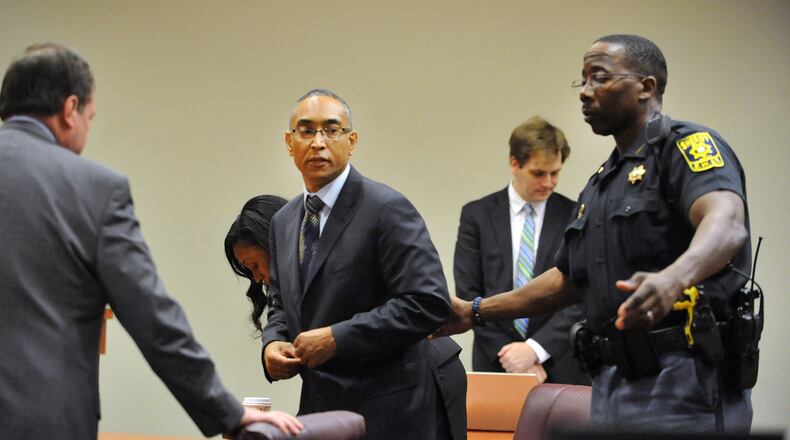A jury found Burrell Ellis guilty Wednesday of attempted extortion and perjury, bringing down one of Georgia’s most powerful elected officials and adding to the list of scandalized DeKalb County politicians.
Just eight months ago, a jury was unable to reach verdicts on any of the charges against the head of DeKalb’s government. But, in a politically risky move, District Attorney Robert James decided to retry the case.
A jury vindicated the prosecutor by finding Ellis guilty of four felonies. Ellis, DeKalb’s CEO since 2009, was acquitted on five other charges.
Ellis showed no reaction as deputies escorted him to jail. He faces up to 10 years in prison when he’s sentenced July 8. A court filing Wednesday indicated he will appeal.
The trial was the most high-profile case in metro Atlanta since former Atlanta Mayor Bill Campbell was convicted on three counts of tax evasion in 2006 and was acquitted on seven counts of racketeering and bribery.
Ellis was found guilty of trying to shake down Power and Energy Services, an Austell business, for a $2,500 campaign contribution and threatening to end its $250,000 contract with the county. He was also convicted on three perjury counts for lying about his role in awarding county contracts.
“This is a step in the cleaning-up process of DeKalb County,” said John Ernst, the chairman of the DeKalb Board of Ethics. “The culture of corruption has been ongoing in DeKalb County for many years.”
One of Ellis’ alleged victims, Greg Shealey of National Property Institute, said he’d like to see some good come from the verdict. Ellis was acquitted on the theft by extortion charge involving Shealey’s company.
“I hope people can trust their elected politicians a little more,” Shealey said. “I want to see DeKalb County move forward and be a good example how a county or municipality is run.”
Ultimately, Ellis’ own words may have done him in.
Jurors listened several times to a recording of a Sept. 27, 2012, campaign solicitation call between him and Brandon Cummings, the president of Power and Energy Services.
“I’m not asking you to make a charitable contribution. I’m asking you to make a campaign contribution,” Ellis told Cummings. The jury heard the recording again during its deliberations Monday.
Members of the jury declined to comment about the case as they left the courthouse. James and lead defense attorney Craig Gillen also didn’t comment, citing a gag order in place until sentencing.
The jury may have been holding Ellis accountable for a county with sordid past, said Philip Anthony, CEO of DecisionQuest, a national trial consulting firm.
Besides Ellis, several other DeKalb officials have been found guilty of criminal charges, including former Commissioner Elaine Boyer, former schools Superintendent Crawford Lewis and several other government employees and appointed officials.
“They see a person like him as the source of the cancer in government,” Anthony said. “I imagine the attitude of these jurors was to focus on the fact that you can’t have the person at the top, leading this organization, condoning these types of offenders.”
Clayton County District Attorney Tracy Graham Lawson, who will become president of the District Attorneys’ Association of Georgia later this month, said a verdict in Ellis’ case may bring closure for the citizens of DeKalb.
“I absolutely think citizens care about corruptions cases, and I think they are overwhelmed by the number of public officials who have been accused of violating their sworn oath,” Lawson said.
The guilty verdict will immediately save taxpayers’ money.
Ellis has been paid his $157,000 annual salary, since he was indicted and suspended from office in July 2013. But now that he’s been found guilty, he will stop collecting a paycheck. Lee May will remain DeKalb’s interim CEO.
Having learned from last fall’s mistrial of Ellis, prosecutors fine-tuned their case this time. They dropped four lesser charges before the trial started. And former purchasing director Kelvin Walton, a key witness who proved a liability in the last trial because jurors didn’t believe him, was called to the stand for briefer periods, to emphasize evidence, rather than testifying for hours as he did in the first trial.
Walton testified seven times about secret recordings he made of his conversations with the CEO. Walton agreed to be wired when he was threatened with criminal charges for lying to the special grand jury.
Ellis testified, as he did in his first trial, insisting that he never punished contractors because they refused to donate to his campaign. He said he did, however, believe the county shouldn’t be doing business those who refused to return his phone calls and those who were rude. Recordings showed he told Walton to “cut the contract” or “dry up” businesses that weren’t responsive to him.
But prosecutors pointed out that Ellis’ calls were always for the purpose of collecting campaign contributions, never about official county business.
“Politicians aren’t kings. Politicians aren’t chiefs. Politicians aren’t people to be held up on some pedestal and bowed down to, like they’re the master of the universe,” James said in his closing argument. “Servants don’t treat people the way Mr. Ellis treated these folks.”
The Latest
Featured



